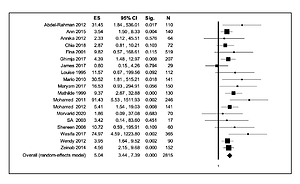Current issue
Archive
Manuscripts accepted
About the Journal
Editorial office
Editorial board
Section Editors
Abstracting and indexing
Subscription
Contact
Ethical standards and procedures
Most read articles
Instructions for authors
Article Processing Charge (APC)
Regulations of paying article processing charge (APC)
INFECTIOUS DISEASES / RESEARCH PAPER
The etiologic role of Epstein-Barr virus and Cytomegalovirus infections in breast cancer development: a meta-analysis of case-control studies
1
Department of Basic Medical Sciences (Microbiology Unit), College of Medicine, University of Bisha, Bisha, Saudi Arabia
2
Department of Medical Microbiology, Faculty of Medical Laboratory Sciences, University of Khartoum, Sudan
3
Department of medical laboratory science, College of applied medical sciences, University of Bisha , Bisha, Saudi Arabia, Saudi Arabia
4
Department of Pediatrics, College of Medicine, Arabian Gulf University, Bahrain., Bahrain
5
Department of Basic Medical Sciences (Microbiology Unit), College of Medicine, University of Bisha, Bisha, Saudi Arabia, Saudi Arabia
Submission date: 2021-07-31
Final revision date: 2022-07-17
Acceptance date: 2022-08-08
Online publication date: 2022-08-11
Corresponding author
Bahaeldin K. Elamin
Department of Basic Medical Sciences (Microbiology Unit), College of Medicine, University of Bisha, Bisha, King Sultan, 61922, Bisha, Saudi Arabia
Department of Basic Medical Sciences (Microbiology Unit), College of Medicine, University of Bisha, Bisha, King Sultan, 61922, Bisha, Saudi Arabia
KEYWORDS
TOPICS
ABSTRACT
Introduction:
The implication of viral infection in alterations of vital cellular pathways and genomic integration and thus, human carcinogenesis is well documented in molecular epidemiology studies. EBV and CMV are two of the most studied human viruses for potential association with cancer risk, progression, and outcome. The contradicting reports as for the etiologic role of these viruses in breast cancer entailed the conduction of the current meta-analysis
Material and methods:
A thorough comprehensive electronic search was performed using PubMed, EMBASE, and Web of Science databases for relevant publications until February 28, 2021 based on predefined eligibility criteria. Extracted data from eligible studies were used to calculate the pooled effect size, heterogeneity, publication bias, sensitivity, and subgroup analyses for both viruses independently. Meta-analyses were performed using Prometa 3 software.
Results:
For EBV, a total of 19 studies were included, while 8 studies were included for CMV. A significantly high risk of breast cancer with EBV infection (OR = 5.04, 95%CI: 3.44 – 7.39, P < 0.05), a similar, though smaller risk with CMV (OR = 4.53, 95%CI: 2.04 – 10.03, P < 0.05). EBV studies in which viral genetic material was detected in fresh breast cancer tissue showed higher risk compared to studies relied upon FFPE specimen. Conversely, for CMV, the FFPE studies showed a higher risk compared to studies relying upon fresh breast cancer tissues.
Conclusions:
It can be inferred that infection with either of the two viruses increases the risk of breast cancer, suggesting an etiologic role of these viruses in breast carcinogenesis.
The implication of viral infection in alterations of vital cellular pathways and genomic integration and thus, human carcinogenesis is well documented in molecular epidemiology studies. EBV and CMV are two of the most studied human viruses for potential association with cancer risk, progression, and outcome. The contradicting reports as for the etiologic role of these viruses in breast cancer entailed the conduction of the current meta-analysis
Material and methods:
A thorough comprehensive electronic search was performed using PubMed, EMBASE, and Web of Science databases for relevant publications until February 28, 2021 based on predefined eligibility criteria. Extracted data from eligible studies were used to calculate the pooled effect size, heterogeneity, publication bias, sensitivity, and subgroup analyses for both viruses independently. Meta-analyses were performed using Prometa 3 software.
Results:
For EBV, a total of 19 studies were included, while 8 studies were included for CMV. A significantly high risk of breast cancer with EBV infection (OR = 5.04, 95%CI: 3.44 – 7.39, P < 0.05), a similar, though smaller risk with CMV (OR = 4.53, 95%CI: 2.04 – 10.03, P < 0.05). EBV studies in which viral genetic material was detected in fresh breast cancer tissue showed higher risk compared to studies relied upon FFPE specimen. Conversely, for CMV, the FFPE studies showed a higher risk compared to studies relying upon fresh breast cancer tissues.
Conclusions:
It can be inferred that infection with either of the two viruses increases the risk of breast cancer, suggesting an etiologic role of these viruses in breast carcinogenesis.
Share
RELATED ARTICLE
We process personal data collected when visiting the website. The function of obtaining information about users and their behavior is carried out by voluntarily entered information in forms and saving cookies in end devices. Data, including cookies, are used to provide services, improve the user experience and to analyze the traffic in accordance with the Privacy policy. Data are also collected and processed by Google Analytics tool (more).
You can change cookies settings in your browser. Restricted use of cookies in the browser configuration may affect some functionalities of the website.
You can change cookies settings in your browser. Restricted use of cookies in the browser configuration may affect some functionalities of the website.



